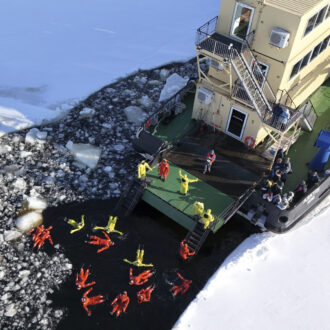“My work is profoundly international, and the scientific community to which I personally feel I belong is located in many parts of the world.
Colleagues and partners exploring the same research areas as my team and people I have met at international conferences, are all building a global puzzle together in the field of cancer cell biology.
My own team that we call Ivaska Lab is my closest community and we work together in Finland, at the Turku Centre of Biotechnology. My internationally recognised team has 18 members including myself. The members are all at different stages of their careers. Some of them are writing their master’s theses, some are working on their doctoral theses and others are post-doctoral researchers. They are men and women from eight different countries with different backgrounds, religions and mother tongues. Together, we form a multidisciplinary research group of equals. We are interested in understanding how integrins contribute to almost every step of cancer progression.
Finnish universities offer a genuinely English-speaking working environment for foreign researchers. All scientists and even the support personnel at universities speak fluent English. Most of the bureaucracy can be dealt with online and in English. The everyday conversations at the lab are also in English, which enables integration irrespective of an individual’s background and also provides the staff with good practise in discussing their topics at conferences and writing papers.
I specialise in the role of cellular changes in metastatic development of cancer. Finnish universities have increased their cooperation with business, which provides researchers with access to new forms of funding. The pharmaceutical companies do not do basic research, but they utilise the results of the research done at universities. We are still working on the rules of this cooperation, since the scientists need to publish their results, even if it is not in the interest of the company.
Finnish society is one of the most stable in the world and it functions well. It is an equal society where everyone is offered a good education and healthcare that is almost free. Even if researchers do not earn top salaries, we still enjoy a good standard of living and a pleasant living environment. Affordable English-speaking daycare facilities and free international schools are a clear advantage for anyone with children working in Finland. Finland does not have big cities, but if you enjoy nature and small town living, this is a great place to live in. Many of the foreign researchers I have persuaded to join my team have ended up staying for years.”
Top 3 reasons to do science in Finland
- First-class research groups that deliver significant results. Recognised team leaders, state-of-the-art equipment and funding possibilities in Finland and EU.
- Largely English-speaking society: Equality is an important value in the Finnish society and the welfare state offers affordable health care, child care and free schools.
- Nature is always nearby and is easily accessible.
By Johanna Ivaska; edited by Päivi Brink and ThisisFINLAND staff, ThisisFINLAND Magazine 2019



